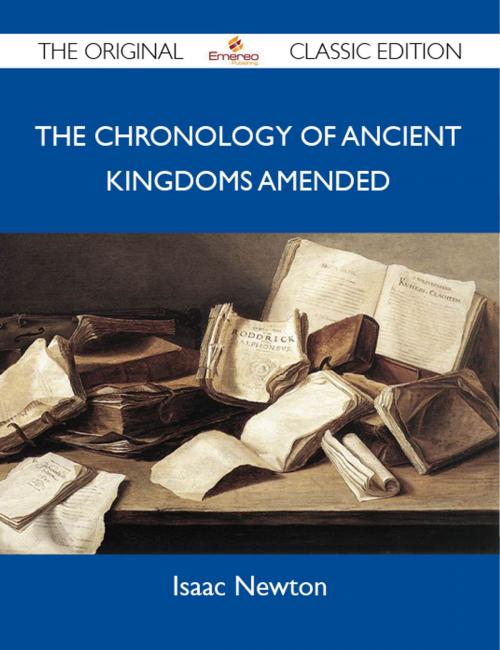The Chronology of Ancient Kingdoms Amended - The Original Classic Edition
Nonfiction, Reference & Language, Reference, Fiction & Literature| Author: | Newton Isaac | ISBN: | 9781486417544 |
| Publisher: | Emereo Publishing | Publication: | October 24, 2012 |
| Imprint: | Emereo Publishing | Language: | English |
| Author: | Newton Isaac |
| ISBN: | 9781486417544 |
| Publisher: | Emereo Publishing |
| Publication: | October 24, 2012 |
| Imprint: | Emereo Publishing |
| Language: | English |
Finally available, a high quality book of the original classic edition.
This is a new and freshly published edition of this culturally important work, which is now, at last, again available to you.
Enjoy this classic work today. These selected paragraphs distill the contents and give you a quick look inside:
Now since Eratosthenes and Apollodorus computed the times by the Reigns of the Kings of Sparta, and (as appears by their Chronology still followed) have made the seventeen Reigns of these Kings in both Races, between the Return of the Heraclides into Peloponnesus and the Battel of Thermopylæ, take up 622 years, which is after the rate of 36½ years to a Reign, and yet a Race of seventeen Kings of that length is no where to be met with in all true History, and Kings at a moderate reckoning Reign but 18 or 20 years a-piece one with another: I have stated the time of the return of the Heraclides by the last way of reckoning, placing it about 340 years before the Battel of Thermopylæ.
...We have now shewed that the Phœnicians of Zidon, under the conduct of Cadmus and other captains, flying from their enemies, came into Greece, with letters and other arts, about the sixteenth year of King Davids Reign; that Europa the sister of Cadmus, fled some days before him from Zidon and came to Crete, and there became the mother of Minos, about the 18th or 20th year of Davids Reign; that Sesostris and the great Bacchus, and by consequence also Osiris, were one and the same King of Egypt with Sesac, and came out of Egypt in the fifth year of Rehoboam to invade the nations, and died 25 years after Solomon; that the Argonautic expedition was about 43 years after the death of Solomon; that Troy was taken about 76 or 78 years after the death of Solomon; that the Phœnicians of Tyre were driven from the Red Sea by the Edomites, about 87 years after the death of Solomon, and within two or three years began to make long voyages upon the Mediterranean, sailing to Spain, and beyond, under a commander whom for his industry, conduct, and discoveries, they honoured with the names of Melcartus and Hercules; that the return of the Heraclides into Peloponnesus was about 158 years after the death of Solomon; that Lycurgus the Legislator Reigned at Sparta, and gave the three Discs to the Olympic treasury, An.
...We may reckon therefore that the expulsion of the Shepherds by the Kings of Thebais, was the occasion that the Philistims were so numerous in the days of Saul; and that so many men came in those times with colonies out of Egypt and Phœnicia into Greece; as Lelex, Inachus, Pelasgus, Æzeus, Cecrops, Ægialeus, Cadmus, Phœnix, Membliarius, Alymnus, Abas, Erechtheus, Peteos, Phorbas, in the days of Eli, Samuel, Saul and David: some of them fled in the days of Eli, from Misphragmuthosis, who conquered part of the lower Egypt; others retired from his Successor Amosis into Phœnicia, and Arabia Petræa, and there mixed with the old inhabitants; who not long after being conquered by David, fled from him and the Philistims by sea, under the conduct of Cadmus and other Captains, into Asia Minor, Greece, and Libya, to seek new seats, and there built towns, erected Kingdoms, and set on foot the worship of the dead: and some of those who remained in Judæa might assist David and Solomon, in building Jerusalem and the Temple.
Finally available, a high quality book of the original classic edition.
This is a new and freshly published edition of this culturally important work, which is now, at last, again available to you.
Enjoy this classic work today. These selected paragraphs distill the contents and give you a quick look inside:
Now since Eratosthenes and Apollodorus computed the times by the Reigns of the Kings of Sparta, and (as appears by their Chronology still followed) have made the seventeen Reigns of these Kings in both Races, between the Return of the Heraclides into Peloponnesus and the Battel of Thermopylæ, take up 622 years, which is after the rate of 36½ years to a Reign, and yet a Race of seventeen Kings of that length is no where to be met with in all true History, and Kings at a moderate reckoning Reign but 18 or 20 years a-piece one with another: I have stated the time of the return of the Heraclides by the last way of reckoning, placing it about 340 years before the Battel of Thermopylæ.
...We have now shewed that the Phœnicians of Zidon, under the conduct of Cadmus and other captains, flying from their enemies, came into Greece, with letters and other arts, about the sixteenth year of King Davids Reign; that Europa the sister of Cadmus, fled some days before him from Zidon and came to Crete, and there became the mother of Minos, about the 18th or 20th year of Davids Reign; that Sesostris and the great Bacchus, and by consequence also Osiris, were one and the same King of Egypt with Sesac, and came out of Egypt in the fifth year of Rehoboam to invade the nations, and died 25 years after Solomon; that the Argonautic expedition was about 43 years after the death of Solomon; that Troy was taken about 76 or 78 years after the death of Solomon; that the Phœnicians of Tyre were driven from the Red Sea by the Edomites, about 87 years after the death of Solomon, and within two or three years began to make long voyages upon the Mediterranean, sailing to Spain, and beyond, under a commander whom for his industry, conduct, and discoveries, they honoured with the names of Melcartus and Hercules; that the return of the Heraclides into Peloponnesus was about 158 years after the death of Solomon; that Lycurgus the Legislator Reigned at Sparta, and gave the three Discs to the Olympic treasury, An.
...We may reckon therefore that the expulsion of the Shepherds by the Kings of Thebais, was the occasion that the Philistims were so numerous in the days of Saul; and that so many men came in those times with colonies out of Egypt and Phœnicia into Greece; as Lelex, Inachus, Pelasgus, Æzeus, Cecrops, Ægialeus, Cadmus, Phœnix, Membliarius, Alymnus, Abas, Erechtheus, Peteos, Phorbas, in the days of Eli, Samuel, Saul and David: some of them fled in the days of Eli, from Misphragmuthosis, who conquered part of the lower Egypt; others retired from his Successor Amosis into Phœnicia, and Arabia Petræa, and there mixed with the old inhabitants; who not long after being conquered by David, fled from him and the Philistims by sea, under the conduct of Cadmus and other Captains, into Asia Minor, Greece, and Libya, to seek new seats, and there built towns, erected Kingdoms, and set on foot the worship of the dead: and some of those who remained in Judæa might assist David and Solomon, in building Jerusalem and the Temple.















